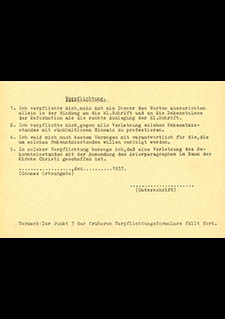Niemöller Founds the “Pastors’ Emergency League”
When, immediately following Ludwig Müller’s election as first German Reich Bishop in September of 1933, the German Christians set about introducing the “Aryan paragraph” in the largest Protestant church in Prussia, more resistance formed, which further strengthened the emergent church opposition. The German Christians’ goal of establishing a Reich Church imbued with Nazi ideology, in which Christians of Jewish descent would no longer have a place, became only all too clearly recognizable in their course of action.
In this situation, Pastor Martin Niemöller announced the founding of the “Pastors’ Emergency League”. From his parish in Berlin-Dahlem, he sent a statement of commitment out to fellow pastors in the Protestant church. In it, signatories pledged to orient the exercise of their office solely toward the Bible and the Book of Concord of the Reformation. Further, they promised to protest any violation of such confessional status, as was manifest in the application of the “Aryan paragraph”, unreservedly.
The response to Niemöller’s writing was extraordinarily strong. In the following four months, some 7,000 Protestant pastors – more than one-third of the Protestant clergy as a whole – signed to become members of the Pastors’ Emergency League.
At its heart, this was an act of Christian solidarity with some thirty to fifty pastors of Jewish descent who were affected by the church’s “Aryan paragraph”. The Pastors’ Emergency League practiced their solidarity in the form of immaterial and material aid. Nevertheless, the Pastors’ Emergency League operated from a perspective confined to the church. The government’s “Aryan paragraph” remained beyond the Pastors’ Emergency League’s horizon of action, just as the Nazi state’s anti-Jewish policies did. Given the widespread religious anti-Judaism among the Protestant clergy and theological considerations related to the fundamental separation of church and state, government discrimination against Jews was not addressed.
The church’s legislation with its “Aryan paragraph” was however abrogated by an amended law of December 8, 1933. Reich Minister of the Interior Frick had approved the law in response to an initiative of Niemöller’s, thus acknowledging the protests of the Pastors’ Emergency League. Hitler himself had decreed in early December that government agencies were not to intervene in the church’s internal conflict. The Nazi state still had an express interest in a unified Protestant church.
In the meantime, some of the German Christians attacked the Pastors’ Emergency League involvement in November, which they denounce as activity hostile to the state. Individual constituent churches of the German Evangelical Church adopted the “Aryan paragraph” and pastors of Jewish descent were dismissed despite the Emergency League’s initiative. Nevertheless, the Pastors’ Emergency League had set a clear-cut example of Christian solidarity. Its further development led to the emergence of the “Confessing Church” in the spring of 1934.
Source / title
- ©Evangelische Arbeitsgemeinschaft für Kirchliche Zeitgeschichte, A 1.5

